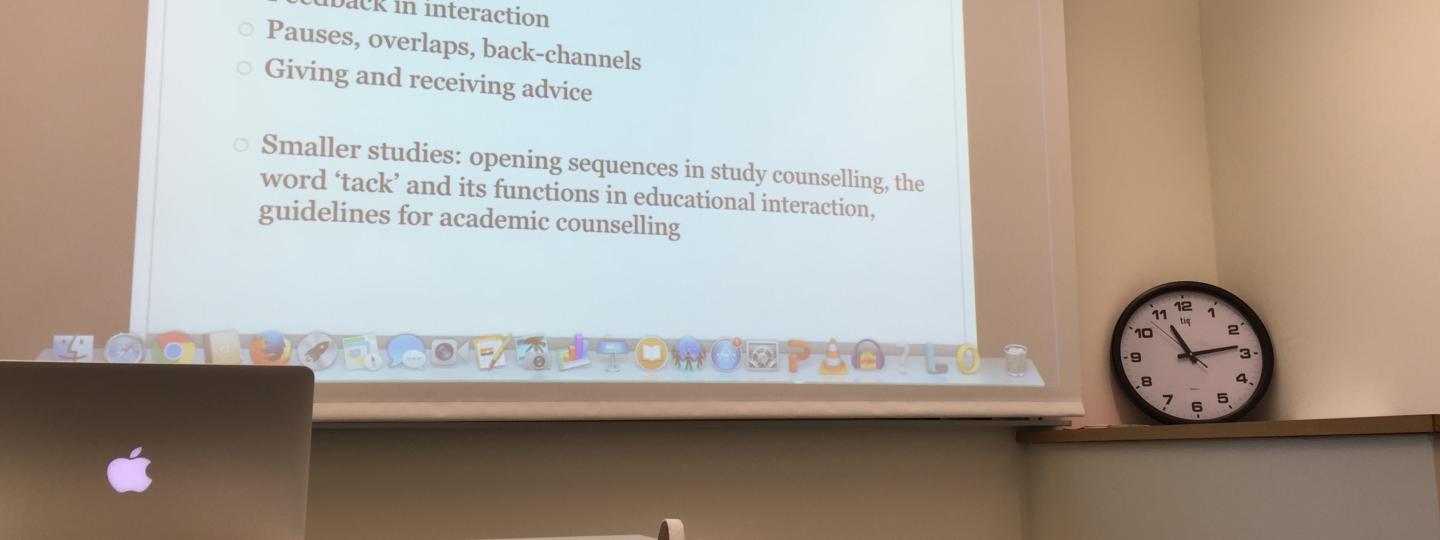Research in the Department of Scandinavian Languages focuses on language history, onomastics, variation of spoken and written language, Swedish language learning, interaction, and pragmatics.
The following thematic collaborations of the University of Turku are represented in the Department's research: digital futures; children, young people and learning; cultural memory and societal change. Strong areas in our research include:
- institutional interaction
- language history and philology
- grammar and lexicon
- multilingualism
- spoken and written Swedish in Finland
- Swedish as a second language
Research projects
Information will be added here soon!
In the project we study the relationship between language, culture and communication. How similar are the communicative patterns found in the two national languages of Finland, Finnish and Swedish, compared to communicative patterns found in Sweden? To what extent can the communicative patterns found be related to cultural preferences in Finland?
The project is a continuation of the research program Interaction and Variation in Pluricentric Languages – Communicative Patterns in Sweden Swedish and Finland Swedish (Riksbankens jubileumsfond 2013–2020). The theoretical framework is Interactional Linguistics, where communicative strategies utilised by individual speakers are related to larger social and cultural contexts. We focus on communication in two types of institutional settings: service encounters at box offices and supervision meetings with students at the university level.
Project leader: Professor Camilla Wide
Researchers: PhD Eveliina Tolvanen, PhD Anu Rouhikoski, Associate Professor Tommi Kurki
Funding: the Swedish Cultural Foundation in Finland, 2023–2026
KISUVI research, funded by Kone Foundation, is a four-year project launched in the School of Languages and Translation Studies at the University of Turku, Finland in January 2022. The project focuses on the study of writing fluency in first and foreign languages, in particular on the use of formulaic sequences.
This mixed-method project uses the graph theory-based keystroke logging software GGXLog, whose visualisation functions provide a new approach to the analysis of writing processes. It also allows a more precise definition of formulaic sequences in languages belonging to different typological families. The results of the project will contribute to the knowledge on the development and fluency of multilingual writers. The results will help educators and policy makers to design and develop teacher training and modern digital learning materials.
Project director: Maarit Mutta, maarit.mutta(at)utu.fi
KISUVI Team: Sinikka Lahtinen, Päivi Laine, Mari Mäkilä, Katja Mäntylä, Outi Toropainen, Anne-Maj Åberg
Project funding: Kone Foundation 2022—2025
Researcher: PhD Mikko Kauko
For more information, see Mikko Kauko's page at the UTU Research Portal.
Funding: the Emil Aaltonen Foundation, the Society of Swedish Literature in Finland 2022–2024
Researcher: PhD Eveliina Tolvanen
Funding: the Society of Swedish Literature in Finland 2023–2024
Part of the research network Swedish in Turku
The research group consists of researchers and teachers at the University of Turku, who are interested in how Swedish is used in multilingual professional settings. Some are from the Department of Scandinavian Languages (ScandLang) at the School of Languages and Translation Studies and some from the Centre for Language and Communication Studies (CeLCS). Some are associated with both units.
Website: https://sites.utu.fi/svenskaniabo/en/
Participants: Camilla Wide (ScandLang), Anne-Maria Kuosa (CeLCS), Anne-Maj Åberg (ScandLang, CeLCS), Eveliina Tolvanen (ScandLang), Rebecka Heinonen (ScandLang), Hanna Saloranta (CeLCS), Laura Grönroos (CeLCS), Maiju Alanen (CeLCS), Annmari Sahlstein (CeLCS, ScandLang), Nina Numminen (CeLCS)
This project aims at enhancing our understanding of the significance of metalinguistic knowledge in language learning and use. We examine the nature of Swedish and Finnish metalinguistic knowledge among students in language islands’ upper secondary schools in Finland. Metalinguistic knowledge refers to reflective and explicit knowledge of grammar, which enables individuals to comprehend and apply their knowledge of structures, functions, and connections in a given language to other languages. We evaluate metalinguistic knowledge through tests and linguistic activities in a unique, bilingual learning context of so-called language islands in Finland. The results add to our understanding of metalinguistic knowledge, particularly of its quality in a bilingual learning environment. The findings contribute to the ongoing discussion on the usefulness of grammar in language acquisition. Understanding the nature and development of metalinguistic knowledge is vital in evaluating its role in language acquisition and use. The results have practical applications in language teaching, especially in minority language contexts where the students’ language skills are crucial for academic success.
The project will start in the autumn of 2023 and is funded by the Swedish Cultural Foundation in Finland.
Researchers involved in the project:
Dr. Outi Toropainen (PI)
Professor Sinikka Lahtinen
Experts:
Professor Urpo Nikanne, University of Åbo Akademi.
Associate Professor Sofie Henricson, University of Helsinki.
Invisible forces: communication with the supernatural in Swedish- and Finnish-language folk traditions from Finland’s bilingual coastal areas (Joonas Ahola, Jesse Barber, Karolina Kouvola, Kendra Willson; the Swedish Cultural Foundation in Finland 2019–2022
Jöns Buddes version av Mechtilds uppenbarelser. Forskning och översättning (Mikko Kauko; the Kone Foundation, the Swedish Cultural Foundation in Finland 2019–2022)
Formulaic sequences and metalinguistic knowledge in second and foreign language learning (Sinikka Lahtinen, Outi Toropainen, Katja Mäntylä, Anne-Maj Åberg, Veijo Vaakanainen, Mari Mäkilä; the Swedish Cultural Foundation in Finland 2017–2021)
Spatial Discourses in Pre-Modern Finland (Marko Lamberg; Swedish Literature Society in Finland, the Swedish Cultural Foundation in Finland and the Turku Institute for Advanced Sciences 2017–2021)
Interaction and Variation in Pluricentric Languages – Communicative Patterns in Sweden Swedish and Finland Swedish (Stockholm University, University of Helsinki, University of Turku, the Institute for Language and Folklore, Gothenburg; Riksbankens jubileumsfond 2013–2020)
Grammatical Competence: A Comparative Study of Noun Phrases and Word order in Written Swedish by Finnish-speaking Early Total Immersion Students and Non-immersion Student (Eeva-Liisa Nyqvist; TIAS 2017–2019)
Finno-Ugric Elements in Runic Inscriptions (Kendra Willson; TIAS 2015–2017)
Experimental Approaches to the Study of Language Ideologies in Swedish-language Finland (Therese Leinonen; Academy of Finland 2013–2016)
N'CLAV: Nordic Collaboration on Language Variation Studies (Camilla Wide; NordForsk 2010–2012)
Towards Communicative Competence: Finnish-speaking Learners' Acquisition of the Structure of Swedish (Marketta Sundman, Eeva-Liisa Nyqvist, Anne-Maj Åberg; Society of Swedish Literature in Finland 2007–2010)
